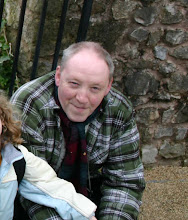The Last Battle is a title of one of C. S. Lewis' Narnia books. It is really about the Christian Last Judgement. It evokes a landscape "further up and further in". An enfolding green landscape. One that I have since I was 11 identified with Weardale as seen from the A68 in the few miles between Fir Tree and Tow Law. I have driven that way 100s of times and on each occasion I call to mind Lewis' visualisation and think to myself about The Last Judgement. The Last Judgement has something of a bad reputation nowadays in this society. I can see why. Whilst as an artistic inspiration it has fed creativity of all sorts, it is also an instrument of fear. Centuries of church manipulation warped The Last Judgement to become a means of controlling earthly behaviour and manipulating power. The idea of finite sin meriting infinite punishment in the most awful of sensual forms excites the most frightening emotions (and we all know how attractive to a certain mind set a horror film is (I never got that genre, something missing in me)). I think that a history of The Last Judgement would reveal humans and a church at their worst.
Yet because of our bad behaviour and lack of faith in love should we ignore The Last Judgement? By no means, rather reflect on what Lewis perceived. That The Last Judgement is our own judgement on ourselves. For when we die and are confronted by the light of creating Love, what will we do? Will we bend down in fear seeking repentence? Will we run towards the light, knowing this was always our destiny? Or will we turn away from what is to what is not? Will our anger and pride destroy us? Whatever, it will be our choice. Truly The Last Judgement is the hour of destiny.
A quote from the book illustrates all this. From page 135 "'You see' said Aslan.'They will not let us help them. They have chosen cunning instead of belief. Their prison is only in their own minds, yet they are in that prison; and so afraid of being taken in that they cannot be taken out'". Look around and you must be able to see this behaviour through human history whether in the great affairs of state or in the matter of marital relationship. Think of World War One. Was there ever such a deadly and un-necessary conflict? One that only the warped ideas of humans created. I reflect on Poincaré and how in World War One Claire Ferchaud was able to confront him personally in the simplicity of Christ. Or how it is that a mother of three children can walk away from them and their father because of "another man"? These are all things that happen, constantly around us. You can provide your own examples. What unites all, men of power or women of infidelity is that whilst Christ wishes to meet them in their sin as Jesus did in First Century Palestine, it is the human who refuses to meet Our Lord. As someone used to say to me in Ayrshire "You choose your bed and lie on it".
Friday, 28 October 2011
Subscribe to:
Post Comments (Atom)








No comments:
Post a Comment